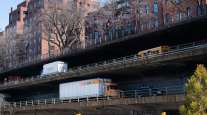Senior Reporter
National League of Cities Report: Infrastructure Among Top Issues for Local Leaders
Local elected officials continue to sound the alarm on the challenges stemming from inefficient transportation networks amid the absence of long-term infrastructure funding assurances from the White House and the U.S. Congress.
According to the “State of the Cities 2018” compiled by the National League of Cities, 56% of the state of the city speeches devoted significant time to infrastructure issues such as roadways, traffic signs, sewers, waste collection, public transit, pedestrian walkway and funding.
In Atlanta, for example, Mayor Keisha Bottoms emphasized the purpose of connecting residents via a transit grid. “We must continue to provide transit options for our working families and build on the largest expansion of MARTA in its history,” the mayor is quoted in the report. The Metropolitan Atlanta Rapid Transit Authority provides subway service to residents and visitors.
Regarding access to clean water, Stan Ridgeway, mayor of Eagle, Idaho, said: “The city continues to be committed to providing quality water service to our residents.”

“The concept of city government is a great American experiment wisely built on a federal structure. For this structure to work best, we need to all work together — cities, state governments and federal government,” according to the report unveiled last month. “We must all come together to govern. Economic development, public safety, infrastructure and management are key issues that drive this nation’s agenda.”
Local commerce, balancing budgets, law enforcement, access to broadband, quality education, health and social services, and management and planning also were the focus of 160 of the local addresses delivered by mayors from January through April, the group determined.
“Large and small, urban and rural, cities across the country are confronted with a growing range of complex issues,” noted Clarence Anthony, CEO and executive director of the National League of Cities. “From ongoing concerns about failing infrastructure and lack of affordable housing, to emerging challenges like the opioid epidemic and climate change, America’s cities are taking the lead to find creative solutions to local government’s most pressing problems.”
Throughout the Trump administration, mayors and governors have urged the federal government to provide additional funding for transportation maintenance and improvements. At the kickoff of the U.S. Chamber of Commerce’s Infrastructure Week on May 14, Austin, Texas Mayor Steve Adler said cities “need a partner that is actually making the hard decisions.”
“This can’t just be relying on local cities and states,” Adler added.
In February, President Donald Trump proposed a $1.5 trillion infrastructure plan that would rely heavily on backing from private investors. States and municipalities also would need to increase their contribution to infrastructure projects. Transportation leaders on Capitol Hill have yet to endorse Trump’s infrastructure guidance.
In New Jersey, Gov. Phil Murphy’s administration announced the state’s infrastructure bank will offer low-interest loans to counties and municipalities as a way to help reduce the cost of transportation projects. The loan program is a partnership between the bank and the state’s DOT.
“The transportation [infrastructure bank] is a unique partnership that will significantly reduce the total cost of local transportation infrastructure by reducing the cost of financing and will enable our communities to increase the number of projects funded,” state DOT Commissioner Diane Gutierrez-Scaccetti said June 8. “The program will provide opportunities for the design and construction of more expensive local projects that cannot be significantly funded with local aid grants.”
Over the years, mayors across the Garden State have called for additional state and federal funding for transportation improvement projects. Before Murphy (D) took office, his predecessor, Gov. Chris Christie (R), signed into law in 2016 a fuel tax increase meant to boost revenue for transportation programs.




